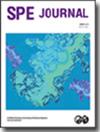老化和温度对固井用可持续单组分地聚合物性能的影响
IF 3.2
3区 工程技术
Q1 ENGINEERING, PETROLEUM
引用次数: 0
摘要
本研究阐明了老化和温度对用于固井和弃井的单组分“只加水”(JAW)花岗岩基地聚合物性能的影响。此外,该研究还深入研究了这些地聚合物的流体状态和早期固态特性,特别强调了它们在老化后的性能。为了评估机械性能,老化过程延长了56天,为了通过专门测试评估水力密封性,老化过程延长了28天。所得结果揭示了指定温度与抽运时间之间的非线性相关关系。值得注意的是,失水问题成为这些地聚合物的一个重大关切。含锌混合料设计的早期强度发展符合行业规范,在养护24小时内达到最低强度要求。锌在地聚合物的初始固化阶段起着增强强度的关键作用,无论是在环境条件下还是在高温下(70℃)。然而,在高温下延长固化后,锌的影响与未修改的混合设计相比略有减少。在大约30天的固化后,在未改性和锌改性的混合物设计中都发生了连续的反应。老化导致材料的水力密封性下降,而这种密封性最初是在固化的早期阶段建立起来的。本文章由计算机程序翻译,如有差异,请以英文原文为准。
Aging and Temperature Effects on the Performance of Sustainable One-Part Geopolymers Developed for Well-Cementing Applications
Summary This study elucidates the effects of aging and temperature over the performance of one-part “just add water” (JAW) granite-based geopolymers for application in well cementing and well abandonment. Additionally, the investigation delves into the fluid-state and early-age solid-state properties of these geopolymers, with a particular emphasis on their performance after aging. The aging process extended up to 56 days for assessing mechanical properties and up to 28 days for evaluating hydraulic sealability through dedicated tests. The obtained results unveil a nonlinear correlation between the designated temperature and pumping duration. Notably, the issue of fluid loss emerged as a significant concern for these geopolymers. The early-age strength development of the mix design containing zinc demonstrates adherence to industry norms by achieving minimal strength requirements within 24 hours of curing. Zinc plays a pivotal role as a strength enhancer during the initial curing stages of geopolymers, both under ambient conditions and at elevated temperatures (70℃). However, upon extended curing at elevated temperatures, zinc’s impact slightly diminishes compared with the unmodified mix design. After around 30 days of curing, a consecutive reaction occurs in both the unmodified and zinc-modified mix designs. Aging leads to a decline in the material’s hydraulic sealability that was initially established during the early stages of curing.
求助全文
通过发布文献求助,成功后即可免费获取论文全文。
去求助
来源期刊

SPE Journal
工程技术-工程:石油
CiteScore
7.20
自引率
11.10%
发文量
229
审稿时长
4.5 months
期刊介绍:
Covers theories and emerging concepts spanning all aspects of engineering for oil and gas exploration and production, including reservoir characterization, multiphase flow, drilling dynamics, well architecture, gas well deliverability, numerical simulation, enhanced oil recovery, CO2 sequestration, and benchmarking and performance indicators.
 求助内容:
求助内容: 应助结果提醒方式:
应助结果提醒方式:


